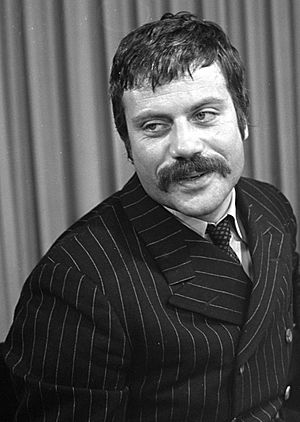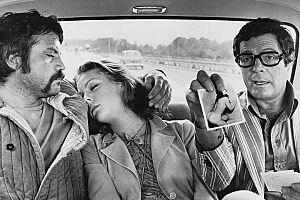Oliver Reed facts for kids
Quick facts for kids
Oliver Reed
|
|
|---|---|

Reed in 1968
|
|
| Born |
Robert Oliver Reed
13 February 1938 Wimbledon, London, England
|
| Died | 2 May 1999 (aged 61) Valletta, Malta
|
| Burial place | Bruhenny Graveyard, Churchtown, County Cork, Ireland |
| Education | Ewell Castle School |
| Occupation | Actor |
| Years active | 1955–1999 |
| Spouse(s) |
Kate Byrne
(m. 1959; div. 1969)Josephine Burge
(m. 1985) |
| Children | 2 |
| Relatives | Sir Herbert Beerbohm Tree (grandfather) Sir Carol Reed (uncle) |
Robert Oliver Reed (born 13 February 1938 – died 2 May 1999) was a famous English actor. He was known for his strong acting roles in many films. Some of his most famous movies include The Trap (1966), Oliver! (1968), Women in Love (1969), The Devils (1971), and Gladiator (2000).
In his final film, Gladiator, he played Antonius Proximo, a tough gladiator trainer. For this role, he was nominated for a special award called the BAFTA Award for Best Actor in a Supporting Role in 2000, after he had passed away. At one point in 1971, he was voted the fifth most popular movie star in Britain. The British Film Institute (BFI) said that his work with directors Michael Winner and Ken Russell made him a very important British film star.
Contents
Early Life and Beginnings
Robert Oliver Reed was born in Wimbledon, southwest London, on 13 February 1938. His father, Peter Reed, was a sports journalist. His mother was Marcia (née Napier-Andrews). Oliver Reed came from a family of talented people. His uncle was the famous film director Sir Carol Reed. His grandfather was the well-known actor and theatre manager Sir Herbert Beerbohm Tree.
Oliver went to 14 different schools, including Ewell Castle School in Surrey. He once said that his father thought he was lazy. Before becoming an actor, Oliver worked in several different jobs. He claimed he was a boxer, a bouncer, a taxi driver, and even a hospital porter. He also served in the Royal Army Medical Corps as part of his army service. He felt that the army helped him understand people better.
Oliver Reed's Acting Career
Starting Out in Films
Oliver Reed began his acting journey as an extra in movies. This means he was in the background without a speaking role. He appeared in films like Value for Money (1955) and The Square Peg (1958) without being named in the credits. He also had small, uncredited parts in TV shows such as The Invisible Man (1958).
His first important role was playing Richard of Gloucester in a BBC TV series called The Golden Spur in 1959. After this, he continued to take small parts in films like The Captain's Table (1959). He also played a bouncer in The Two Faces of Dr. Jekyll (1960) for Hammer Films. This company would later give him many important roles.
Reed got his first significant credited role in Hammer Films' Sword of Sherwood Forest (1960). He then had smaller roles again in comedies and dramas.
Becoming a Main Actor
Oliver Reed's first starring role came when Hammer Films chose him for the main character in The Curse of the Werewolf (1961). This was a big step for his career. Hammer Films liked his work and gave him more good supporting roles. He appeared in adventure films like The Pirates of Blood River (1962) and Captain Clegg (1962). He also starred in the science fiction film The Damned (1963) and the thriller Paranoiac (1963).
During this time, he also acted in some TV shows. He had the main role in a horror film called The Party's Over (made in 1963, released in 1965).
Working with Famous Directors
In 1964, Oliver Reed starred in The System, which was the first of six films he made with director Michael Winner. This film was seen by director Ken Russell, who then cast Reed in a TV movie about the French composer Claude Debussy called The Debussy Film (1965). Oliver Reed said this role was very important for him because it was the first time he played a character who was not a villain. He felt that Hammer Films gave him his start, Michael Winner gave him work, and Ken Russell helped him create art.
He also narrated Ken Russell's TV movie Always on Sunday (1965). Reed returned to Hammer Films for The Brigand of Kandahar (1965), where he played a villain. He later said this was the worst film he made for Hammer. He also had a regular role in the TV series R3 (1965). Reed then took the lead role in The Trap (1966), a film made in Canada and Britain.
His career grew even more when he starred in the popular comedy film The Jokers (1966), his second movie with Michael Winner. After playing a villain in The Shuttered Room (1967), he made a third film with Winner, I'll Never Forget What's'isname (1967), which also starred Orson Welles. Reed worked with Ken Russell again on the TV movie Dante's Inferno (1967), where he played Dante Gabriel Rossetti.
Oliver! and Becoming a Star
Oliver Reed became even more famous when he played the villainous character Bill Sikes in the film Oliver! (1968). This movie was directed by his uncle, Carol Reed. Oliver! was a huge success and won the Academy Award for Best Picture. Oliver Reed received much praise for his strong performance as Bill Sikes.
He then appeared in the adventure film The Assassination Bureau (1969) and a war film for Michael Winner, Hannibal Brooks (1969). Even more successful was his fourth film with Ken Russell, Women in Love (1969). In 1969, he was given the International Star of the Year Award.
In 1970, Reed starred in the thriller The Lady in the Car with Glasses and a Gun. The next year, he appeared in the film The Devils (1971), also directed by Ken Russell.
There was a rumor that Oliver Reed could have been chosen to play James Bond. In 1969, the producers of the Bond films were looking for a new actor to replace Sean Connery. Oliver Reed was considered, along with Timothy Dalton and Roger Moore. However, Oliver Reed never played James Bond. After his death, a newspaper called this "One of the great missed opportunities of post-war British movie history."

He then made several action-packed films: The Hunting Party (1971), a Western; Sitting Target (1972), a gangster film; and Z.P.G. (1972), a science fiction movie. He also made The Triple Echo (1972) with Glenda Jackson. Reed appeared in several Italian films, including Dirty Weekend (1973).
He had great success playing Athos in The Three Musketeers (1973) and The Four Musketeers (1974). His next project with Ken Russell was Tommy, where he played Tommy's stepfather. This film was based on The Who's famous album. He also appeared in Royal Flash (1975) and had a small role in Russell's Lisztomania (1975).
Reed acted alongside Karen Black and Bette Davis in the horror film Burnt Offerings (1976). He returned to adventure films in Crossed Swords (also known as The Prince and the Pauper) (1977), playing Miles Hendon. He worked with Mark Lester again, who had been in Oliver!.
He made Tomorrow Never Comes (1978) and The Big Sleep (1978). He and Glenda Jackson were together again in The Class of Miss MacMichael (1978). Reed returned to the horror genre as Dr. Hal Raglan in David Cronenberg's 1979 film The Brood.
Films in the 1980s and Beyond
After the 1970s, Oliver Reed's films were not as widely successful. He made a comedy called Dr. Heckyl and Mr. Hype (1980). He played General Rodolfo Graziani in Lion of the Desert (1981), a film about the resistance to Italian rule in Libya.
Reed played a villain in Disney's Condorman (1981) and in the horror film Venom (1981). He was also a villain in The Sting II (1983). He starred as Lt-Col Gerard Leachman in the Iraqi historical film Al-Mas' Ala Al-Kubra (1983). Reed appeared in many other films during the 1980s, such as Spasms (1983), Two of a Kind (1983), and Christopher Columbus (1985).
He considered stopping acting when Nicolas Roeg cast him in Castaway (1986). In this film, he played Gerald Kingsland, a man who advertised for a "wife" to live on a desert island with him for a year.
Reed was featured on the British TV show This Is Your Life in 1986. He appeared in many films that were released directly to video, including Gor (1987) and Skeleton Coast (1988).
He was in Terry Gilliam's The Adventures of Baron Munchausen (1988), playing the god Vulcan. He also appeared in The Lady and the Highwayman (1989) with Hugh Grant. He reunited with director Richard Lester for The Return of the Musketeers (1990). Other films included Treasure Island (1990) with Charlton Heston and The Pit and the Pendulum (1991).
Final Roles
In his later years, Oliver Reed appeared in films such as Return to Lonesome Dove (1993), Funny Bones (1995), and Parting Shots (1998). His very last role was as Proximo, an elderly slave dealer, in Ridley Scott's film Gladiator (2000). He acted alongside Richard Harris, whom he greatly admired. The film was released after Reed's death. Some of his remaining scenes were completed using a body double and computer effects. Gladiator was dedicated to him. Besides his BAFTA nomination, he also shared a Screen Actors Guild Award nomination with the other main actors in the film.
Music Career
Besides acting, Oliver Reed also released some songs. However, they did not become very popular. Some of his singles included "Wild One" (1961) and a duet with Joyce Blair called "Baby It's Cold Outside." In 1992, he recorded "Wild Thing" as a duet with snooker player Alex Higgins. Oliver also narrated a song called "Walpurgis Nacht" for an Italian heavy metal band called Death SS.
Personal Life
In 1959, Oliver Reed married Kate Byrne. They had one son named Mark before they divorced in 1969. While filming Oliver! (1968), he met Jacquie Daryl, a dancer who was also in the movie. They had a daughter named Sarah. In 1985, he married Josephine Burge. They remained married until his death. In his final years, Oliver Reed and Josephine lived in Churchtown, County Cork, Ireland.
In December 1974, Oliver Reed was a guest on the BBC Radio 4 show Desert Island Discs. On this show, guests talk about their lives and choose eight favorite songs they would take if they were stranded on a desert island. He chose "Jardins sous la pluie" by French composer Claude Debussy as his favorite song. When asked what book he would take, he chose Winnie-the-Pooh by A. A. Milne.
Death
Oliver Reed passed away from a heart attack on 2 May 1999. He was 61 years old. This happened in Valletta, Malta, while he was taking a break from filming Gladiator.
His funeral was held in Churchtown, County Cork, Ireland, where he had lived. His body was buried in Churchtown's Bruhenny Graveyard. The words on his gravestone say, "He made the air move."
Aftermath of His Death
Because Oliver Reed died during the filming of Gladiator, his remaining scenes had to be finished using a body double and special computer graphics (CGI). Despite this, he was nominated for a BAFTA Award for Best Supporting Actor after his death. Russell Crowe, who starred in Gladiator, said that Oliver Reed had visited him in dreams and asked him to speak kindly of him.
Filmography and Awards
Books
- Reed, Oliver (1981). Reed All About Me. Sevenoaks, Kent, UK: Coronet Books. ISBN 9780340260142. OCLC 1052806394. https://archive.org/details/reedallaboutme00reed.
Images for kids
See also
 In Spanish: Oliver Reed para niños
In Spanish: Oliver Reed para niños
 | Jackie Robinson |
 | Jack Johnson |
 | Althea Gibson |
 | Arthur Ashe |
 | Muhammad Ali |


